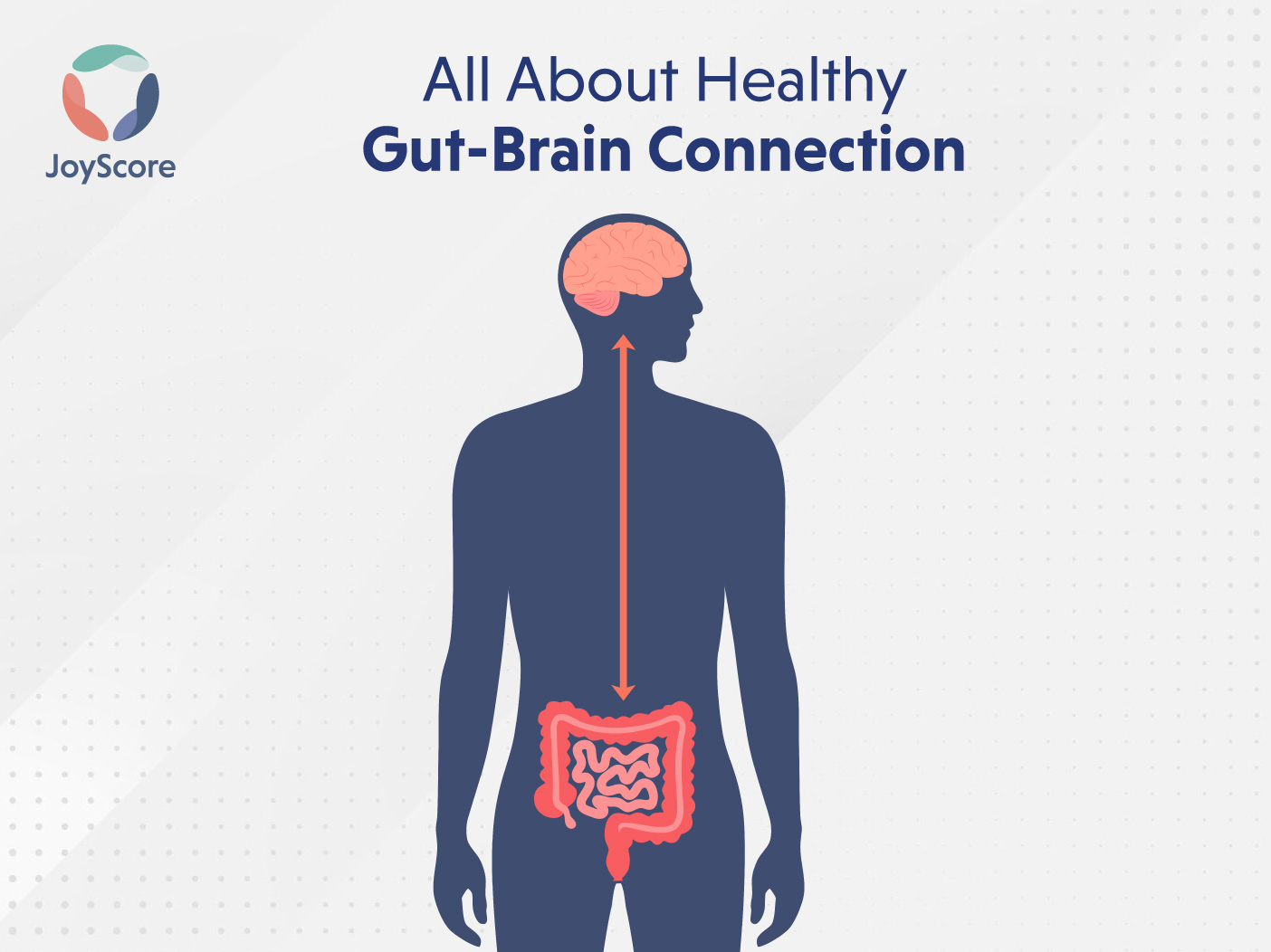The Gut-Brain Connection
The gut health or gut microbiome of an individual refers to the microorganisms living in your intestine. Your overall health depends on a healthy gut with an adequate number of beneficial microbes. This healthy system helps you digest what you eat and absorb the nutrients derived from your food.
A long list of factors that can influence your gut health in either way, good or bad. Out of them, the most common one is your brain functioning. If we put it in simple words, we can say, gut health is good when your mental health is good and vice versa. Your brain also follows how your gut works.
There is direct communication between the liver, brain, and gut, which is termed the gut-brain axis. Therefore, gut bacteria are disturbed if your mental health is under pressure, which can directly affect your digestion. Everybody has heard and experienced the saying, “butterflies in your stomach,” which prove how sensitive your gastrointestinal tract (GIT) is to different emotions such as anger, anxiety, and sadness. Another example would be the release of juices in the stomach on the very thought of eating.
Similarly, your brain also feels tired and stressed out if your gut is not functioning well due to some physical problem. Therefore, it becomes important to understand the gut-brain connection. Now, let us read about some symptoms that tell you if your gut or brain is not functioning well.
SYMPTOMS OF AN UNHEALTHY GUT-BRAIN CONNECTION
1) HEARTBURN
An unhealthy gut will lead to indigestion of the food you take. In such a situation, one will feel a burning sensation in the chest that occurs due to acid regurgitation into the esophagus.
2) INDIGESTION OR DYSPEPSIA
A poor gut-brain connection is the cause of a painful or burning sensation in your abdomen. Indigestion is often confused with heartburn.
3) DIARRHEA OR CONSTIPATION
The slowing down of the stomach ultimately increases the functioning of the large intestine. Consequently, you will feel the urgency to rush to the washroom. On the other hand, an upset mind or stress can also make you tense your muscles leading to constipation.
4) BLOATING OR CRAMPING
In some people, a disrupted mind-gut connection becomes the reason for bloating. Bloating is basically swelling or feeling of fullness in the abdomen, which can be very irritating. It is often accompanied by cramps that cause abdominal pain.
5) INFLAMMATION
Inflammation in your body is not always the result of some underlying infections or diseases. Improper digestion of food may also be a cause. Indigestion of food increases the gas production in our stomach. These unnecessary gasses weaken your intestinal walls letting the gut bacteria enter your bloodstream and causing inflammation in the body.
Chronic low-grade inflammation is a silent killer as it can cause some deadly diseases like cardiovascular disease, cancer, type-2 diabetes, etc.
6) ENHANCE THE PAIN
People who are suffering from GIT disorders experience pain more acutely. This happens because your brain becomes more responsive to pain signals. Therefore, stress makes your existing pain even worse.
7) RISK OF INFECTIONS
A super stressed mind makes you fall prey to infections because of a compromised immune system.
8) ANXIETY AND DEPRESSION
Anxiety causes gasses and bloating, and this condition can, in turn, lead to an increase in your anxiety levels and depression. If this vicious cycle continues, chronic problems in your gut-brain connection can become a reason for your mood swings.
9) SLEEP DISORDERS AND RESTLESSNESS

Acid reflux is related to difficulty in sleeping. Most people experience indigestion which becomes worse in the evening, and the acid reflux wakes them during the night. This makes them feel restless the next day.
REMEDIES TO TREAT POOR Gut-Brain Connection
A compromised Gut-Brain connection cannot be left untreated for a long period of time. There is a long list of solutions you can adapt to treat this problem. Let’s discuss some remedies to keep our gut-brain connection healthy.
1) FERMENTED FOOD FOR PROBIOTICS
Fermented foods must be taken on a daily basis as they naturally contain probiotics or have probiotics added to them. Some common fermented foods good for your gut are yogurt, kefir, pickles, kimchi, sourdough bread, some cheeses, etc.
2) FIBER-RICH FOODS
Cellulose present in the insoluble fiber cannot be digested by your body. Therefore, it acts as a source of food for your gut microbiota or good bacteria. Fiber-rich food will also add bulk to your excreta and help relieve constipation. For example, carrots, broccoli stems, asparagus stalks, etc.
3) ANTI-INFLAMMATORY FOODS
As you all know that a poor gut-brain connection often results in inflammation in your body, so these foods will be beneficial to solve the problem. Some common inflammatory foods are
– Vegetables like broccoli, sprouts, cabbage, cauliflower
– Fruits that contain deeply colored pigments like cherries, grapes, berries
– Herbs like ginger root
– Spices like turmeric, cinnamon, fenugreek
– Healthy fats, i.e., olive oil, coconut oil
4) DRINK PLENTY OF WATER
Drinking at least 8 glasses of water in a day not only keeps you hydrated but is also good for your kidneys. Therefore, water helps to wash out toxins from your body and purifies your blood.
5) AVOID ALCOHOL AND SMOKING
Smoking restricts the proper working of your liver, limiting its role in the digestion of your food. It becomes even worse when smoking is combined with alcohol. Therefore, one must control his/her urge for these harmful addictions or take the help of smoking cessation resources.
6) INTERMITTENT FASTING

Intermittent fasting is an approach where you eat for certain hours and then switch to fasting for another set of hours. Let’s say you eat for 8 hours and fast for another 16 hours. Evidence suggests that this type of eating pattern is beneficial for your gut health and boosts your gut microbes.
7) REGULAR EXERCISING
A good mind-gut connection can be maintained not only with a healthy gut but also with a stress-free brain. Therefore, exercises like jogging, swimming, cycling, walking, gardening, dancing, etc. must be practiced regularly. These aerobic exercises help reduce anxiety and depression.
8) FRESH AIR EVERYDAY TO RELAX YOUR BODY AND MIND
Go for a walk or jog every day in natural surroundings like a garden or a park.
9) AROMATHERAPY

Aromatherapy is a type of complementary and alternative medicine used to relieve pain, improve mood and promote a sense of relaxation. Aromatic plant extracts and essential oils are used in this therapy. It is often followed by massage and acupuncture.
10) MEDITATION AND PRAYER
Meditating or praying will help induce a sense of positivity in your brain. This will, therefore, help in better sleep and relax your mind.
11) SET BOUNDARIES IN SOCIAL AND PERSONAL RELATIONSHIPS
One must know where to say NO. Following your heart, every time may hurt you. Compromising your mental peace to satisfy your emotions will only give you anxiety and depression.
CONCLUSION
An imbalance in your mental health or gut health is an alarming signal which should not be overlooked.
Don’t let your overstressed mind hinder the body’s ability to metabolize your food. And also, do not allow your disrupted gut functioning to induce anxiety and other mental illnesses. An improved gut-brain connection will show regulated bowel movements, healthy and glowing skin, and a body full of energy. For more such tips, download the JOYSCORE APP for healthy living.
Download the Joyscore app Now!
Download on the Appstore
Get it on Google Play



